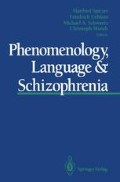Abstract
Since the time of Griesinger (1845) and Snell (1852), disturbances of thought and language have always been of special importance in descriptions and concepts of mental illness. This observation also applies to “dementia praecox” or “the group of schizophrenias” established by Emil Kraepelin (1899) and Eugen Bleuler (1911) at the beginning of our century. Kraepelin introduced the term “Zerfahrenheit” for special types of disturbances with very characteristic features, defined as “loss of internal or external connection of the chain of ideas,” or as “loss of internal unity”. His interpretation of these phenomena was similar to many contemporary concepts, e.g. that of Stransky (1914), who used the metaphor of “intrapsychic ataxia”. Also, Eugen Bleuler’s (1911) descriptions of schizophrenic thinking became of major influence. Bleuler gathered together—along with disturbances of affect, ambivalence and autism—the disorders of thought and language—especially “loosening of associations”—as characteristic fundamental symptoms which are always present in schizophrenia.
Access this chapter
Tax calculation will be finalised at checkout
Purchases are for personal use only
Preview
Unable to display preview. Download preview PDF.
References
Andreasen NC: Thought, language, and communication disorders. I. Clinical assess-ment, definition of terms, and evaluation of their reliability. II. Diagnostic sig-nificance. Archives of General Psychiatry 36: 1315–1321, 1325–1330, 1979
Andreasen NC: Affective and schizophrenic disorders. New York, Brunner/Mazel, 1982
Aschaffenburg G: Experimentelle Studien über Assoziationen. III. Theil: Die Ideenflucht. In: Kraepelin E (Ed): Psychologische Arbeiten, Vol. 4. Leipzig, Engelmann, pp. 235–373, 1904
Baeyer WV: Die moderne psychiatrische Schockbehandlung. Stuttgart, Thieme, 1951
Berze J: Die primäre Insuffizienz der psychischen Aktivität. Leipzig, Wien, Deuticke, 1914
Berze J (1929) Psychologie der Schizophrenie. In: Berze H, Gruhle HW (Ed): Psychologie der Schizophrenie. Berlin Heidelberg New York, Springer, 1929
Beringer K: Denkstörungen und Sprache bei Schizophrenen. Zeitschrift für die gesamte Neurologie und Psychiatrie 103: 185–197, 1926
Berrios GE: Positive and negative symptoms and Jackson. Arch Gen Psychiatry 42: 95–97, 1985
Bleuler E: Dementia praecox oder die Gruppe der Schizophrenien. Leipzig, Wien, Deuticke, 1911
Bleuler E, Jung CG: Komplexe und Krankheitsursachen bei Dementia praecox. Zentralblatt für Psychiatrie und Nervenheilkunde 3: 220–227, 1908
Crow TJ: Molecular pathology of schizophrenia. More than one dimension of patho-logy? Brit Med Journal 280: 66–68, 1980
Crow TJ: The two-syndrome concept: Origins and current status. Schiz Bull 11: 471–485, 1985
Dilthey W: Ideen über eine beschreibende und zergliedernde Psychologie (1894). In: Misch G (Ed): Gesammelte Schriften, 4th ed, Vol. V, 139–237, Stuttgart, Teubner, 1974
Fish FJ: Schizophrenia. London, Wright, 1962
Griesinger W: Die Pathologie und Therapie der psychischen Krankheiten. Stuttgart, Krabbe, 1845
Gruhle HW: Die Psychologie der Dementia praecox. Z Neurol 78: 454–471, 1922
Gruhle HW: Psychologie der Schizophrenie. In: Berze J, Gruhle HW: Psychologie der Schizophrenie. Berlin, Springer, 1929
Hoffman RE, Kirstein L, Stopek S, Ciccetti DV: Apprehending schizophrenic discourse: A structural analysis of the listeners task. Brain and Language 15: 207–233, 1982
Hoffman RE, Stopek S, Andreasen NC: A comparative study of manic vs schizophrenic speech disorganisation. Archives of General Psychiatry 43: 831–838, 1986
Husserl E: Logische Untersuchungen. 2. Teil: Untersuchungen zur Phänomenologie und Theorie der Erkenntnis. Halle a.S., Niemeyer, 1901
Jackson H: On postepileptic states: A contribution to the comparative study of insanities. J Ment Science 34: 490–500, 1889
Janet P: Les obsessions et la psychasthénie. Paris, Alcan, 1903
Jaspers K: Allgemeine Psychopathologie (1st ed 1913 ). 9th ed, Berlin Heidelberg New York, Springer, 1973
Jung CG (Ed): Diagnostische Assoziationsstudien, 2 Vols. Leipzig, Barth, 1906/1910
Jung CG: Über die Psychologie der Dementia praecox. Halle, Marhold, 1907
Kraepelin E: Psychiatrie. 5th ed. Leipzig, Barth, 1896
Kraepelin E: Psychiatrie. 6th ed. Leipzig, Barth, 1899
Kraepelin E: Psychiatrie. 7th ed 2 Vols. Leipzig, Barth, 1903/04
Kraepelin E: Dementia praecox. Chicago, Chicago Med Book, 1919
Mayer-Gross W, Slater E, Roth U: Clinical Psychiatry. Baltimore, Williams and Wilkins, 1955
Peters UH: Die Verwerfungen im Sprach-und Textverhalten Schizophrener. In: Kraus, A, Mundt CH,(Hrsg.): Schizophrenie und Sprache, pp. 8–21. Thieme, Stuttgart, 1991
Reynolds JR: On the pathology of convulsions, with special reference to those of children. Liverpool Med. Chir. J. 2: 1–4, 1858
Sass H: The classification of schizophrenia in the different diagnostic systems. In: Häfner H, Gattaz, WF, Janzarik W (eds): Search for the causes of schizophrenia, pp. 19–28. Berlin Heidelberg New York Tokyo, Springer, 1987
Sass H: The historical evolution of the concept of negative symptoms in schizophrenia. Brit J Psychiatry 155 (suppl. 7): 26–31, 1989
Schneider C: Die Psychologie der Schizophrenen und ihre Bedeutung für die Klinik der Schizophrenie. Leipzig, Thieme, 1930
Schneider K: Clinical Psychopathology (transl. by Hamilton MW). New York, Grune & Stratton, 1959
Snell L: Über die veränderte Sprechweise und die Bildung neuer Worte und Ausdrücke im Wahnsinn. Allgemeine Zeitschrift für Psychiatrie 9: 11–24, 1852
Stransky E: Lehrbuch der allgemeinen und speziellen Psychiatrie. I. Allg. Teil. Leipzig, F.C. Vogel, 1914
Strauss JS: Negative symptoms: Future developments of the concept. Schiz Bull 11: 457–460, 1985
Tress W, Pfaffenberger U, Frommer, J: Zur Patholinguistik schizophrener Texte. Eine vergleichende Untersuchung an Schizophrenen, Depressiven, Hirnorganikern und Gesunden. Nervenarzt 55: 488–495, 1984
Wing JK, Brown GN: Institutionalism and schizophrenia. Cambridge, Cambridge University Press, 1970
Wundt W (1874) Grundzüge der physiologischen Psychologie. Leipzig, Engelmann, 1874
Editor information
Editors and Affiliations
Rights and permissions
Copyright information
© 1992 Springer-Verlag, New York
About this chapter
Cite this chapter
Sass, H. (1992). Phenomenological Aspects on “Zerfahrenheit” and Incoherence. In: Spitzer, M., Uehlein, F., Schwartz, M.A., Mundt, C. (eds) Phenomenology, Language & Schizophrenia. Springer, New York, NY. https://doi.org/10.1007/978-1-4613-9329-0_10
Download citation
DOI: https://doi.org/10.1007/978-1-4613-9329-0_10
Publisher Name: Springer, New York, NY
Print ISBN: 978-1-4613-9331-3
Online ISBN: 978-1-4613-9329-0
eBook Packages: Springer Book Archive

